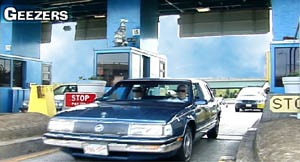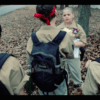
Hey, Kid, You Got a Permit to Shoot Here?
Written by Peter Bohush | Posted by: Anonymous
So ya wanna make a movie in Massachusetts? Great news: the state has created a wonderful program to help you find fee-free locations. But don’t think that means there’s no red tape, or that every location in the state will be free. And don’t assume that free means easy. But a little effort can yield some wonderful location opportunities in the Bay State.
As an agency under the state Department of Economic Development, the Massachusetts Film Office clearly had in mind bringing Hollywood productions (and their cash) to the state when it launched its fee-free location program. But local and independent filmmakers benefit from it, too (even if the only financial benefit we bring the location town is buying donuts and coffee.)
When I decided to write, direct, and produce my short digital movie "Geezers" this year, the Producer Me made the mistake of not asking the Director Me if he was sure he could shoot the locations that the Writer Me had written. Silly Me.
I set out to write a ten- to 12-minute script that I could shoot on the cheap. The intent was to create a showcase piece for myself and the cast and crew, and also to put the new digital video and editing technologies through a real-life test run.
Somewhere along the line, the Writer Me turned the little ten-minute story into a 30-minute road movie with period locations. Still no problem, I thought, as I began the casting process with blissful ignorance as to the demands of the script. When I found my cast, but learned that I had less than a week to shoot out one of the leads before he left town, reality hit me like a brick on the head.
Breaking down my script revealed 60 scenes, with 30 unique locations. One third of the script took place in 1939, so period issues further complicated the issues. The script’s locations included a park in Boston’s North End, a Mass Pike toll booth, the "T," a mansion and its grounds with a pond, a senior center, a carnival in 1939, assorted small town streets, a spot overlooking Lake Quinsigamond, a beach at night, an Oriental rug store, a highway rest stop and an apartment in Boston. What was Writer Me thinking?
My first step was a call to the Massachusetts Film Office (617-973-8800; http://www.magnet.state.ma.us/film/). John Alzapiedi, production coordinator, took the time to return my call and point me in the right direction to secure location approvals. (Tip: start here for any film/video production. They are the knowledge base of filmmaking in Massachusetts.)
Kevin Chapman of the Boston Film Bureau (617-635-3245; http://www.ci.boston.ma.us/film/) gave me the skinny on shooting in the City of Boston. (Tip to low-budget filmmakers: don’t.) The city has valid reasons for its filmmaking regulations, and it has its act together. But filming in Boston can entail submitting permit applications to several departments, including police, fire, and highway. This is common in many big cities. Additionally in Boston, neighborhood
associations have formed to oversee film production in some areas, and approval must be obtained from these citizen groups as well.
(Friendly tip to non-union productions: set aside enough parking space for the Teamsters to park their busload of picketers. They will appreciate the gesture and say so when they shout at you through their bullhorns. Yes, I’ve heard they actually do disrupt non-union films, when they feel it’s a necessary action to get their professional, dues-paying members positions on the few feature films that shoot in the state. Who can blame them? Aside: This is a historic tradition in the state, ever since a wagonload of Teamsters rolled over to the docks of Boston and tossed that non-union tea into the harbor in 1773. In fact, unions in Massachusetts date back to 1648, with the founding of the Bay Colony Stoning and Dunking Workers union. Later, they merged with Local 1692, the Witch Burners Union, and all was well until the Journeyman Printers strike in 1776. This strike effectively shut down the non-union Revolutionary War for three weeks, since no one could make copies of the Declaration of Independence to send to England, or make maps to Concord and Lexington for the soldiers. But these days, everything is fine as long as you use the local professionals on your film crew. Further aside: my shoot was not involved in anything like this, probably because they either didn’t know I existed–I had the same trouble with girls in high school–or because I had no budget, and my offer to double the zero pay for any union crew members was wisely ignored. End of tip, aside and further aside. Back to shooting in Boston.)
If you plan to shoot in the city, get the permits and be prepared to pay for the services you get, such as police, traffic enforcement, etc. Including permitting fees, bond, and personnel fees, Boston will cost about $2,000 for a day’s shoot.
(Another note to indies: there is some murkiness as to the official definition of what constitutes a film shoot in Boston. Bringing in a cast and crew of 50 people, trailers, and a five-ton grip truck would be an obvious example of an actual production. But so is a production of three people with a camera and tripod on Hanover Street. However, a gathering of ten people who are videotaped or filmed by a friend or bystander holding a camera on his shoulder looks an awful lot like a group of tourists who videotape themselves with a juggler in front of Quincy Market. And Boston certainly doesn’t want to make a busload of Presbyterian tourists post a bond and have a traffic control officer follow them around so they can videotape themselves on the Duck Tour. So one could make the case that "tripod equals production, hand-held equals tourist" for small-sized
productions in Boston. In other words, if you look like a film crew, you are a film crew. If you look like tourists–and tourists don’t use tripods or tap into 220 lines–you can be tourists and shoot without hassle. Use common sense, of course, regarding insurance and stuff. If you think you’d like to shoot some actors in paramilitary garb storming up to the USS "Constitution" in a speedboat, you should plan to do it through proper channels, or expect to be sunk in the channel by US Navy gunners.)
Shooting on the "T" requires contact with MBTA film liaison Dorothy Novak (617-222-4400). Similar rules apply to those of Boston. The MBTA is willing to consider filmmakers’ requests, including using a subway car parked off the line or moving but closed to the public. This is a special request, though, and give them time to consider and approve it. And they decide what kind of extra services or personnel will be required to assist on the shoot, and you may have to pay for that. We shot an actor riding the "T," no dialogue or lights, so again, it just looked like a tourist shooting video and didn’t cause any disturbance or notice.
The Mass Pike does not generally allow filmmaking at its tollbooths or on the highway, for obvious reasons of safety–and the fact that a tollbooth is a 24-hour-a-day money machine for the MTA, a veritable oil well of cash, two bits at a time. Bob Bliss, public relations director for the Massachusetts Turnpike Authority (617-248-2823), was extremely sympathetic to my begging and pleading of him to push through my application letter. Lo and behold, MTA management did approve my request to use a coin booth at the Allston-Brighton interchange. The scene was critical to the story, and I was willing to accept any restrictions they wanted to impose on the shoot. They allowed us to shoot for two hours early one Sunday morning, when traffic was light.
To use the Pike toll booth, a special insurance policy was required, naming the MTA as a certificate holder in case anything went wrong. The policy cost a few hundred dollars from Marvin Kaplan Insurance Agency in Boston (617-345-0666). Marvin has been around since before talkies, and knows how to put a movie production insurance policy together.
Don’t be surprised if the policy is longer than your screenplay (but hopefully not a better read). Written by attorneys, the film policy will list every possible thing you can imagine that, if it should happen, they will not cover.
A last-minute glitch occurred around the insurance. The tollbooth shoot was scheduled for Sunday morning. Late Friday afternoon, the insurance policy was finally ready, and I assumed I could pay for it via credit card and sign the document via fax. Oh, no. (Silly Me again.) I had to get to Marvin’s office in South Boston with CASH to pay for it, then get it to the MTA so they could sign the final approval. It would have been a close call to get there from central Massachusetts under any circumstances. The only snag I hit was waiting in a long line at the tollbooths! I made it with minutes to spare. (Note to self: get a Fast Lane pass.)
The MTA also has a permitting application fee, and requires that a state police trooper park nearby and watch the crazy Massachusetts drivers scream by at ungodly speeds. Since the MTA does not have a dedicated film liaison (why would they, since no one films at the booths?) it takes a little patience to move through the organization. This would be expected any time a film crew requests approval to shoot at a non-film location, such as inside a large corporation. I wish I had had a few weeks instead of a few days to get through this process–it put a burden on them and pressure on me.
Upon arriving at the tollbooths, my crew donned spiffy orange vests and had a great shoot. (Note to MTA: yes, we did give back all of the "free samples" you supplied us to toss into the coin basket.)
Shooting a scene at Lake Quinsigamond State Park was a breeze, both on site and bureaucratically. Bill Dunham of the Department of Environmental Affairs (617-727-3180) was friendly and helpful. We faxed back a simple application, and because state parks are part of the fee-free locations, that was basically it. Bill suggested we contact the park manager to go over details of our shoot. Then he even called me up after the shoot to ask how things went!
Most of the rest of the shoot was done in and around Shrewsbury, MA. Some creative rewrites allowed me to use my house and yard for the Boston apartment, mansion grounds, and even the beach. (Toss a little sand on the ground, shoot low, and, voila, a beach.) I also used the underside of my deck as a carnival in 1939. Don’t worry–we’ll make it work in post!
The town of Shrewsbury was extremely accommodating, allowing us to shoot on and around the town common, at a park, and even outside town hall. Each day of the shoot, I informed the police where we would be, just in case they got any calls from concerned citizens. I made sure they understood up front that the production would be small and wouldn’t cause distraction or disturbance. I have found that if you are willing to respect people’s lives and property, they will usually allow you to film. Big Hollywood films have gotten a reputation for damaging property and causing disturbances–hard to avoid when you drop in 100 people and a fleet of trucks, not to mention destroying the town with asteroids.
Eight members of the local antique car club and others volunteered to bring their old cars to town hall so we could get some shots establishing the 1939 period. They didn’t need to do this, but came out in the 90-degree heat as a favor to one of their members who acts in the film. It gave us some shots that we never expected to have. Various businesses allowed us to shoot on their properties, which added some wonderful atmosphere, particularly shooting in front of the 20-foot-tall rooster in Northboro.
Mass Health and Fitness allowed us to stage the production there and use its restaurant for makeup and lunch locations. We also used its baby-sitting room as the interior for the senior center, and the Pike rest stop scene was rewritten to shoot in the health club’s men’s room. For those people and businesses who went beyond what we asked for, I am extremely grateful. It shows the true nature of the people of Massachusetts (when they’re out of their cars.)
Along with the "official" locations that the state promotes, the numerous parks, houses, towns, businesses, and attractions in Massachusetts give filmmakers an almost endless supply of interesting places to shoot. A hundred films could be shot in the state without duplicating the locations or scenery. Multiply this by the locations and resources in the other New England states, add in the great acting, directing, writing, and production talent, and I can’t think of a better place to be a filmmaker.










